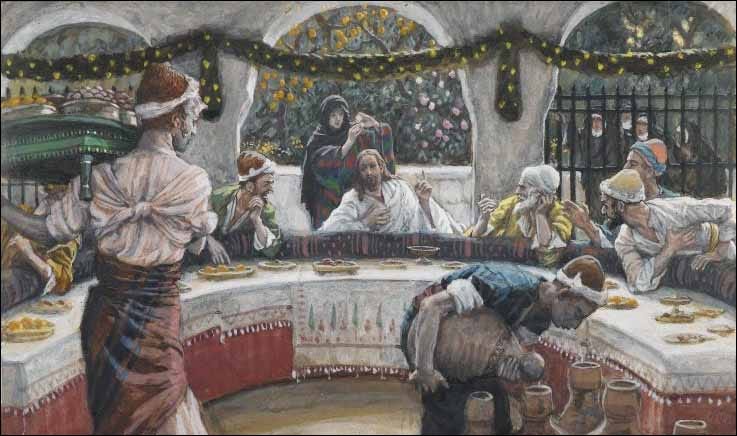Sunday’s Reflection—Taking Last Place
August 31, 2025
Luke 14:1, 7-14
On one occasion when Jesus was going to the house of a leader of the Pharisees to eat a meal on the sabbath, they were watching him closely.
When he noticed how the guests chose the places of honor, he told them a parable. "When you are invited by someone to a wedding banquet, do not sit down at the place of honor, in case someone more distinguished than you has been invited by your host; and the host who invited both of you may come and say to you, `Give this person your place,' and then in disgrace you would start to take the lowest place. But when you are invited, go and sit down at the lowest place, so that when your host comes, he may say to you, `Friend, move up higher'; then you will be honored in the presence of all who sit at the table with you. For all who exalt themselves will be humbled, and those who humble themselves will be exalted."
He said also to the one who had invited him, "When you give a luncheon or a dinner, do not invite your friends or your brothers or your relatives or rich neighbors, in case they may invite you in return, and you would be repaid. But when you give a banquet, invite the poor, the crippled, the lame, and the blind. And you will be blessed, because they cannot repay you, for you will be repaid at the resurrection of the righteous."Photo by Matt Collamer on Unsplash
In today’s Gospel, once again we see how Jesus turns the tables on his adversaries. This time it happens when Jesus was invited for a Sabbath dinner at the house of a leading Pharisee. Luke’s Gospel says that while he was there, “they were watching him closely.” I assume they did this to see if he would heal someone or do something “forbidden” on the Sabbath. But it also says: Jesus was watching them, and saw how they assembled and jockeyed for the places of honor. So, Jesus decided to use this as a teaching moment and told two parables. Like a double-barreled shotgun, Jesus aimed one parable at the guests and the other at the host, to put them in their places, and turn their worldviews upside-down. Jesus aimed his first parable, about proper wedding etiquette, at his fellow guests. He said: “When you are invited by someone to a wedding banquet, do not sit down at the place of honor, in case someone more distinguished than you has been invited by your host.”
Photo by Patrick Langwaller on UnsplashAt this point, I have a confession to make. As a minister who has done several weddings, I’m not crazy about weddings. I enjoy attending them, but I don’t always enjoy presiding at them. (I say, give me an honest funeral any day…) Weddings always seem to bring out the best and the worst in people. If you ever happen to be with a group of clergy talking about their experiences of weddings, I can assure you, you’ll hear some doozies. Occasionally, there are lovely exceptions. Many years ago, I was honored to perform the wedding of my cousin and her husband at Christ Episcopal Church in Cambridge, Massachusetts. Established in 1759, Christ Church is a beautiful white colonial church with traditional box pews. During the 18th century (before the Free Pew Movement), all pews in America were "rented". Instead of having pledges or a "freewill offering" each week, churches raised money by renting out pews. People had their own “family pew”, just as one would rent an apartment.
Christ Episcopal Church, Cambridge, Massachusetts
On one wall of Christ Church, I saw a chart displaying the 18th-century nave seating arrangement, with dollar amounts assigned to different pews. Most pews were assessed at different rates, like the seating arrangement when attending the orchestra. The most expensive pews were those about five rows from the pulpit, right in front. The preacher could be heard and seen easily from up front. Then the "prices" of the pews declined as you moved away from the minister while he stood in the pulpit. Have you ever been to a wedding where the seating arrangement is very important and a fancy card with your name on it is placed at your seat? Traditionally, the most important seats at the head table, closest to the bride and groom, are set aside for the best man and maid of honor, and then the full wedding party. Other guests are typically seated at tables based on family, friends, or common interests. Knowing one's right place is important. Sometimes these formal wedding receptions are intensely competitive events. People vie for recognition and for a prominent place at the reception dinner, the wedding, and in the wedding photo afterwards. Great consternation happens if the bride’s parents are divorced, and the question arises—which “father” will escort the bride down the aisle? Will it be her real but estranged father or her stepfather? These decisions have great pastoral implications and can affect people for the rest of their lives. “She didn’t even let me walk her down the aisle!” (And don’t get me started about the time when several groomsmen came drunk to my church in California for the wedding rehearsal and left empty vodka bottles lying around the sacristy.) This competitive spirit often spills over when Americans travel abroad. The British are not automatically impressed by what most of us Americans think are attractive American qualities—that is, straightforwardness, openness, can-doism, enthusiasm, and our ability to fix things. The English consider it pushy and impolite to do two things: 1) to jump the line in a queue, or 2) to speak to someone unless you’ve not been properly introduced or to call someone by their first name until you have known them for a while. Sarah Lyall, an Op-ed columnist, once wrote an article about Londoners for the New York Times.1 She said, “Once, in an experiment designed to illustrate Britons’ unease with the way Americans introduce themselves in social situations (in Britain, you’re supposed to wait for the host to do it), I got a friend at a party we were having to go up to a man he had never met. ‘Hi, I’m Stephen Bayley,’ my friend said, sticking out his hand. ‘Is that supposed to be some sort of joke?’ the Englishman responded.” In England, queuing is a fundamental part of social etiquette. It's considered extremely impolite to cut in line, and people are expected to patiently wait their turn. Joining the back of the queue is the standard practice. Maintaining a respectful distance and being mindful of personal space are also important aspects of English queuing etiquette. Even reserving space for others is frowned upon.
People walk in a five-mile long queue in front of Tower Bridge to pay their respects to the late Queen Elizabeth II during the Lying-in State at Westminster Hall, in London, England, Friday, Sept. 16, 2022. (AP Photo/Markus Schreiber)Jesus advised people at the banquet to take the lowest place, where the poor and the cheap seats were. If the host doesn’t say to you, `Friend, move up higher’”, at least you gained a broader perspective to see how the other half lives. Jesus wasn’t just preaching humility but quiet inclusiveness and living outside of one’s silo. Jesus aimed his second parable at the host who only invited his family, friends, and the socially important, but neglected the poor and the outcast. Jesus essentially told his host: You’ve got everything wrong. By inviting only friends, family, and those who can raise your social status, you’re no better than these guests who are fighting over the best seat in the house. You’re trying to make yourself look good by surrounding yourself with “important” people, while you ignore the ones who really need your hospitality. Jesus recognized both the guests and his host were social climbers, and he wanted to urge them toward true generosity, real hospitality that expects nothing in return.
Jesus at Table with the Pharisee, James Jacques Tissot
Social climbing is not viewed favorably in our culture. even though it happens all the time. Several years ago, I came across a book called The Social Climber's Bible: A Book of Manners, Practical Tips, and Spiritual Advice for the Upwardly Mobile by Dirk Wittenborn and Jazz Johnson (heiress of the Johnson and Johnson fortune). Half serious, half satire, this book begins with the question: “Do you have the courage to open your eyes to the importance of the superficial in postmodern life? If so, you already have the makings of a good social climber. Follow our instructions, embrace our dos and don’ts of upward mobility, and social climbing will cease to be something you have to do in order to get ahead and instead become a way of life.”2 Personally, I can’t imagine anything worse. Jesus wasn’t about upward mobility—but downward mobility. His treasure was God’s “anawim” (עֲנָוִים) the poor and unseen in Israel—the least and the lost. This is what the late Dominican Liberation theologian, Fr. Gustavo Gutiérrez, called “God’s preferential option for the poor.” Countless saints, from St. Francis of Assisi and St. Martin de Porres to Mother Teresa, discovered that when they offered hospitality to strangers and the poor in their midst, they encountered Christ. The Letter to the Hebrews says: “Do not neglect to show hospitality to strangers, for by doing that some have entertained angels without knowing it.” The Hebrew word for "foreigner” or "stranger" appears ninety-two times in the Old Testament. Hospitality is at the heart of the Old Testament just as it is in the Gospels, a fact which so-called MAGA Christians seem to have forgotten.
Mother Teresa tending to the poorest of the poor of Calcutta
Rev. Gabriel Salguero, president of the National Latino Evangelical Coalition, once said, "Hospitality is not at the margins of scripture. Jesus wasn't kidding around when he said, 'I was a stranger and you welcomed me.”3
Today’s parables prove Jesus wasn’t concerned about social etiquette or creating a first-century Miss Manners' Guide to Excruciatingly Correct Behavior. He wasn’t worried about the seating arrangement for the Pharisees but rather how their behavior reflected their pride, the state of their souls, and their priorities. When Jesus said the first will be last and the last first, he was not only talking about the kingdom of God turning the social order upside-down but also about ushering in a new kind of inclusiveness and equality. We would do well to follow his example.
Inspirational Quotes
"True humility is not thinking less of yourself; it is thinking of yourself less" — C. S. Lewis “Pride makes us artificial and humility makes us real."—Thomas Merton "A great man is always willing to be little."—Ralph Waldo Emerson “Even at my age, I'm trying to improve. Never give up, no matter what. Even if you get last place–finish.”—Louis Zamperini
Sabbaths 2005 - 2008
by Wendell Berry4
2006
I
If there are a “chosen few”
then I am not one of them,
if an “elect,” well then
I have not been elected.
I am one who is knocking
at the door. I am one whose foot
is on the bottom rung.
But I know that Heaven’s
bottom rung is Heaven
though the ladder is standing
on the earth where I work
by day and at night sleep
with my head upon a stone.
2007
IX
I go by a field where once
I cultivated a few poor crops.
It is now covered with young trees,
for the forest that belongs here
has come back and reclaimed its own.
And I think of all the effort
I have wasted and all the time,
and of how much joy I took
in that failed work and how much
it taught me. For in so failing
I learned something of my place,
something of myself, and now
I welcome back the trees.1 Susan Lyall, “Ta-Ta, London. Hello, Awesome.” New York Times, Aug. 17, 2013. 2 Dirk Wittenborn and Jazz Johnson, The Social Climber's Bible: A Book of Manners, Practical Tips, and Spiritual Advice for the Upwardly Mobile (New York: Random House, 2014.) 3 Timothy Beal, “BibliFact Roundup #3: Biblical Aliens, SB 1070 and a Jericho March”, Huffpost, Apr 30, 2012. 4Wendell Berry, Leavings (Berkeley, CA: Counterpoint Press, 2010) 61, 96.








